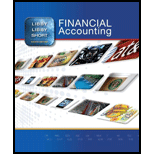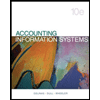
Financial Accounting, 8th Edition
8th Edition
ISBN: 9780078025556
Author: Robert Libby, Patricia Libby, Daniel Short
Publisher: McGraw-Hill Education
expand_more
expand_more
format_list_bulleted
Question
Chapter 3, Problem 1Q
To determine
Describe a typical business operating cycle.
Expert Solution & Answer
Explanation of Solution
Operating cycle:
The operating cycle is the period of time which is required to meet the initial outlay of cash used to purchase, produce, and sell inventory to customers and collect cash from the customer.
A typical business operating cycle:
The operating cycle starts from the initial outlay of cash used for the purchase of the raw materials, production, selling of the produced goods for cash and credit to the customers and cash is collected for the goods that are sold to customers on account and is used to purchase the raw materials again, thus this is a typical business operating cycle.
Want to see more full solutions like this?
Subscribe now to access step-by-step solutions to millions of textbook problems written by subject matter experts!
Students have asked these similar questions
Hello tutor please given General accounting question answer do fast and properly explain all answer
Compute the unit contribution margin of this accounting question
Please answer the following requirements on these general accounting question
Chapter 3 Solutions
Financial Accounting, 8th Edition
Ch. 3 - Prob. 1QCh. 3 - Prob. 2QCh. 3 - Write the income statement equation and define...Ch. 3 - Explain the difference between a. Revenues and...Ch. 3 - Define accrual accounting and contrast it with...Ch. 3 - Prob. 6QCh. 3 - Prob. 7QCh. 3 - Explain why stockholders equity is increased by...Ch. 3 - Explain why revenues are recorded as credits and...Ch. 3 - Complete the following matrix by entering either...
Ch. 3 - Complete the following matrix by entering either...Ch. 3 - Prob. 12QCh. 3 - State the equation for the net profit margin ratio...Ch. 3 - Which of the following is not a specific account...Ch. 3 - Prob. 2MCQCh. 3 - Prob. 3MCQCh. 3 - Prob. 4MCQCh. 3 - Prob. 5MCQCh. 3 - Prob. 6MCQCh. 3 - Prob. 7MCQCh. 3 - Prob. 8MCQCh. 3 - Prob. 9MCQCh. 3 - Prob. 10MCQCh. 3 - Prob. 1MECh. 3 - Reporting Cash Basis versus Accrual Basis Income...Ch. 3 - Prob. 3MECh. 3 - Prob. 4MECh. 3 - Prob. 5MECh. 3 - Prob. 6MECh. 3 - Prob. 7MECh. 3 - Prob. 8MECh. 3 - Prob. 9MECh. 3 - Prob. 10MECh. 3 - Prob. 11MECh. 3 - Prob. 1ECh. 3 - Prob. 2ECh. 3 - Prob. 3ECh. 3 - Prob. 4ECh. 3 - Prob. 5ECh. 3 - Determining Financial Statement Effects of Various...Ch. 3 - Prob. 7ECh. 3 - Prob. 8ECh. 3 - Prob. 9ECh. 3 - Prob. 10ECh. 3 - Prob. 11ECh. 3 - Prob. 12ECh. 3 - Prob. 13ECh. 3 - Prob. 14ECh. 3 - Prob. 15ECh. 3 - Prob. 16ECh. 3 - Prob. 17ECh. 3 - Prob. 18ECh. 3 - Prob. 1PCh. 3 - Recording Journal Entries (AP3-2) Ryan Terlecki...Ch. 3 - Prob. 3PCh. 3 - Prob. 4PCh. 3 - Prob. 5PCh. 3 - Prob. 6PCh. 3 - Prob. 7PCh. 3 - Prob. 1APCh. 3 - Prob. 2APCh. 3 - Prob. 3APCh. 3 - Prob. 4APCh. 3 - Prob. 5APCh. 3 - Prob. 6APCh. 3 - Prob. 1CPCh. 3 - Prob. 2CPCh. 3 - Prob. 3CPCh. 3 - Prob. 4CPCh. 3 - Prob. 6CPCh. 3 - Evaluating an Ethical Dilemma Mike Lynch is the...Ch. 3 - Prob. 1CC
Knowledge Booster
Similar questions
- Financial Accountingarrow_forwardTwo investors are evaluating Anywhere e-SIM Ltd.’s stock for possiblepurchase. They agree on the expected value of D1 and also on theexpected future dividend growth rate. Further, they agree on theriskiness of the stock. However, one investor normally holds stocksfor 2 years, while the other normally holds stocks for 10 years.Is it true that they should both be willing to pay the same price forthis stock? Explain based on how stocks are valued and provide anumerical example to support your arguments.arrow_forwardPlease need answer the accounting questionarrow_forward
arrow_back_ios
SEE MORE QUESTIONS
arrow_forward_ios
Recommended textbooks for you
- Principles of Accounting Volume 2AccountingISBN:9781947172609Author:OpenStaxPublisher:OpenStax College
 Pkg Acc Infor Systems MS VISIO CDFinanceISBN:9781133935940Author:Ulric J. GelinasPublisher:CENGAGE L
Pkg Acc Infor Systems MS VISIO CDFinanceISBN:9781133935940Author:Ulric J. GelinasPublisher:CENGAGE L  Managerial Accounting: The Cornerstone of Busines...AccountingISBN:9781337115773Author:Maryanne M. Mowen, Don R. Hansen, Dan L. HeitgerPublisher:Cengage Learning
Managerial Accounting: The Cornerstone of Busines...AccountingISBN:9781337115773Author:Maryanne M. Mowen, Don R. Hansen, Dan L. HeitgerPublisher:Cengage Learning

Principles of Accounting Volume 2
Accounting
ISBN:9781947172609
Author:OpenStax
Publisher:OpenStax College


Pkg Acc Infor Systems MS VISIO CD
Finance
ISBN:9781133935940
Author:Ulric J. Gelinas
Publisher:CENGAGE L

Managerial Accounting: The Cornerstone of Busines...
Accounting
ISBN:9781337115773
Author:Maryanne M. Mowen, Don R. Hansen, Dan L. Heitger
Publisher:Cengage Learning
